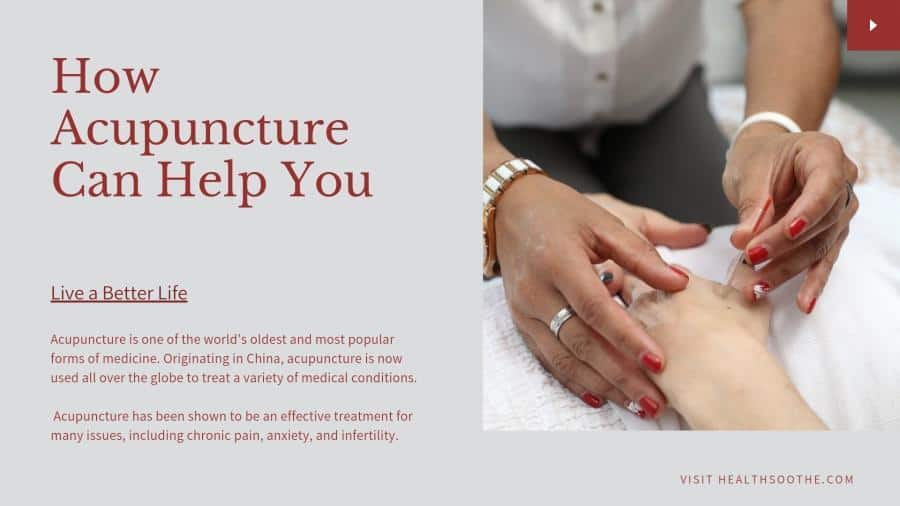Acupuncture originated in China as a traditional practice that focuses on energy flow and natural healing. It has now been used in holistic healing to treat a variety of conditions, ranging from various respiratory illnesses to depression! It is performed by a variety of professionals, ranging from your local chiropractor, acupuncturists, and certified naturopaths. Many people can experience pain relief, tension release, or an improved mood after their acupuncture appointment. As this practice grows in popularity, more and more people are becoming curious about it. This article features everything you need to know about acupuncture, keep reading to learn more.
What is Acupuncture?
Acupuncture is a traditional Chinese medicine that has been around for thousands of years. It works as a technique to balance the flow of energy within your body, otherwise known as qi. This is done by inserting small needles into specific areas of the body to send signals to the brain that in turn promote pain relief and overall wellness.
How Does Acupuncture Work?
Inserting acupuncture needles into the skin is said to activate nerves, stimulate muscles, and promote pain relief. As a result, this wakes up the central nervous system by releasing chemicals from the brain to the spinal cord and muscles. The release of these chemicals is believed to promote both physical and emotional wellbeing.
What Does Acupuncture Treat?
Because acupuncture improves both physical and emotional wellbeing, acupuncture is prescribed to treat a large variety of conditions. This includes conditions such as,
- Back & neck pain
- Osteoarthritis
- Migraines & headaches
- Fibromyalgia
- Myofascial pain
- Carpal tunnel syndrome
- Asthma
- Acne and eczema
These are only some of the conditions that acupuncture can help treat. It is said to also help relieve symptoms of various mental health disorders, such as
- Anxiety
- Depression
- Panic Disorder
- Post-traumatic stress disorder (PTSD)
- Obsessive-compulsive disorder (OCD)
Does Acupuncture Hurt?
Because the needles are very thin, most people barely feel them when they are inserted into the skin. Some people feel virtually no pain at all! However, for first-timers, acupuncture can be slightly more painful, because it activates muscles in a way they have never been stimulated before. It is common for people to experience soreness after their appointment.
Is Acupuncture Safe?
Acupuncture is considered to be totally safe if it is performed by a licensed, experienced professional. The risks are very minimal, as long as the needles are sterile and the acupuncture is performed in a clean environment. These needles are disposed of after use, so the chance of infection is generally incredibly low. You should talk to your doctor beforehand if you have a pacemaker, breast implants, are pregnant, or have any chronic skin conditions.
How Long Does Acupuncture Take?
The acupuncture session itself does not take too long. However, first-timers will most likely go through a general wellness checkup and physical examination with their acupuncturist prior to their sessions. The actual session can take anywhere from 20 minutes to an hour and a half.
How Many Sessions of Acupuncture Do You Need?
While this is entirely dependent on the condition you are aiming to treat with acupuncture, you can expect to attend one or two sessions a week. Typically, it takes around six to eight sessions to help with most conditions.
How Long Does it Take to Feel Results From Acupuncture?
You can feel improvement in as little as one session. This, of course, depends on the condition you are treating, but if the acupuncture treatment is effective, you can expect to feel some relief in as little as one to three sessions. Assuming you have one session per week, most of the positive results are felt three or four days after the appointment. However, most people can expect to feel energized and relaxed immediately after the appointment.
How Much Does Acupuncture Cost?
Depending on the practitioner, prices for acupuncture will vary. According to GoodRx Health, the average cost for acupuncture is around $112 for initial visits and $80 for follow-ups. However, prices can reach up to $400 depending on the clinic. Thankfully, some insurance plans actually cover acupuncture.
Is Acupuncture Covered by Insurance?
Most private insurance companies cover acupuncture. Recently, public insurance companies, like Medicare and Medicaid, have also started covering expenses for acupuncture. However, you will have to check the specifications of your plan’s coverages, because some insurance plans only cover acupuncture for certain conditions.
How Do You Know if Acupuncture is Working?
Typically, acupuncture initially can feel somewhat uncomfortable. You can feel numbness, lethargy, or tingliness after your session, but this indicates that the acupuncture is actually working! More commonly, people feel relaxed and energetic after their appointment.
Is Dry Needling the Same as Acupuncture?
Dry needling is not the same as acupuncture. The needles used in dry needlings are thicker and longer than the thin, hair-like needles used in acupuncture. While acupuncture focuses on naturally stimulating the muscles, dry needling uses a more intense stimulation in order to encourage muscles to release.
Conclusion - Everything You Need to Know About Acupuncture
If you’re struggling with anxiety, back pain, depression, migraines, or any of the various other conditions listed above, you may find acupuncture especially helpful. Like most holistic treatments, acupuncture focuses on a whole-body approach that channels healing in both the mind and body. You may go to a certified acupuncturist because you are experiencing a nagging pain in your lower back, but find that your overall mood improved tremendously with each appointment. Thankfully, with acupuncture becoming increasingly popular, more insurance companies are finding a place for it in their plans, allowing more people to experience its benefits. If you find yourself curious about acupuncture, you should give it a chance. It might do more for you than you would think!



